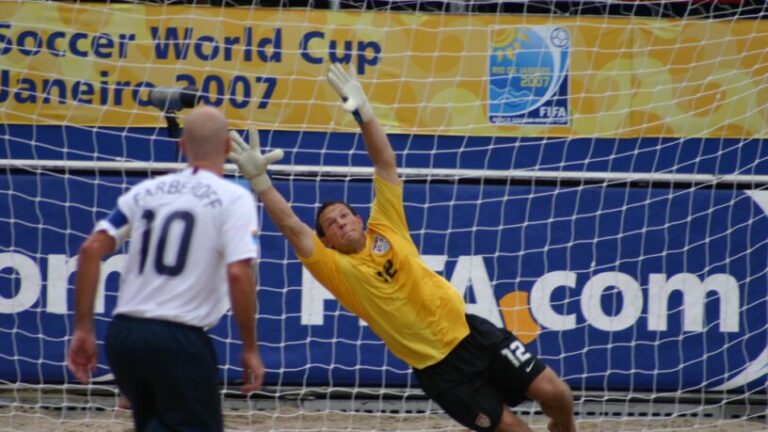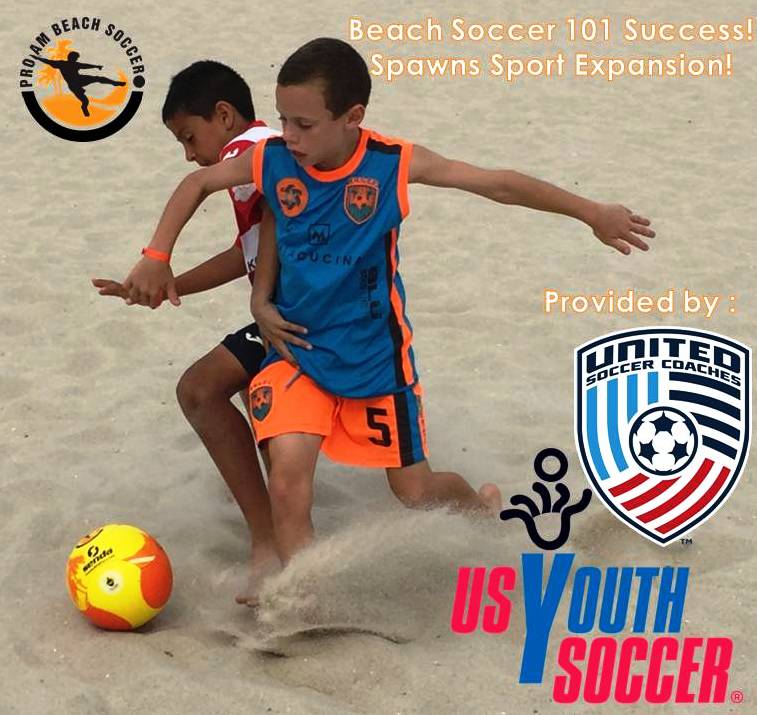Beach soccer is a form of sand training, and a popular variation of the beautiful game played worldwide. From the sunny beaches in Brazil to the clear waters in Spain, you can be sure to find someone playing beach soccer at any given moment.
Beach soccer is similar to Futsal in that it is played with four outfield players and one goalkeeper on a much smaller field or court than a full-sized grass field. Playing soccer on the beach is physically and mentally demanding, but it is absolutely one of the best ways for grass players to improve their soccer skills directly.
Training and playing soccer in the sand requires a lot of technical ability, ball control skills, an excellent first touch, high athletic performance, strength, and endurance. Although beach soccer is technically its own sport, it can be a great training tool for grass soccer players, young, amateur, or professional, to improve their athletic performance and decrease the risk of injuries, including overuse injuries.
Crucial Benefits Of Training at the Beach
Sand training is not a new technique; in fact, it has been around for decades, and many of the best clubs in the world incorporate some sand training into their training sessions because it has many benefits, including:
Improving Fitness Faster
According to Pinnington and Dawson, who have been studying sand training for years, the energy cost of training on sand is 1.5 times greater aerobically and 2.5 times greater anaerobically than grass training. In simple terms, they concluded that sand training is a very time-efficient form of exercise and resistance training because training on sand, a soft surface, enhances conditioning faster than training on firmer surfaces, like grass.
Don’t believe me or Pinnington and Dawson? If you can, go outside and run on grass. Then run the same distance on sand and compare your heart rate. Running on sand will require more effort, and will usually give you a higher heart rate, proving how much harder you have to work on sand, a very unstable surface.
Decreasing muscle soreness
Although sand training has a higher energy cost than grass training, as mentioned previously, a study done on British footballers by Impellizzeri et al concluded that the level of muscle soreness was far less in players who trained on sand compared to the players who played on firmer surfaces, because there is less stress on the body when running on a soft surface.
Improving speed and agility
The same study by Impellizzeri et al. concluded that plyometric training on sand also helped the athletes improve their 10 M sprint and 20 M sprint times and increase their jumping abilities. Impellizzeri et al. is a key study showing the importance of sand training on athletic development, including jumping and sprinting, two of the most essential actions in soccer.
The Role of Beach Soccer in Injury Prevention
The two studies in the previous section show that sand training is a very time-efficient exercise, does not lead to as much muscle soreness as training on harder surfaces, and even improves a player’s ability to sprint faster and jump higher. However, the many benefits of this popular form of training do not end there because they also tie into injury prevention.
Beach soccer is a crucial tool in injury prevention and recovery, and it can help players perform better and more confidently.
Barefoot Training
Many of the main benefits of beach training come from playing barefoot. Playing barefoot, compared to playing with shoes, is a completely different experience and forces you to engage your feet and entire body in different ways.
When you play barefoot, you explicitly strengthen your feet and fascia in ways you cannot with cleats on, leading to better overall body control, balance, and athletic performance. Many of the best soccer countries, such as Brazil, emphasize barefoot training and beach soccer significantly, which is one reason why they are so athletic and sound at this sport.
Remember, your feet are your only connection to the ground, and having functional, strong feet will improve your confidence and ball-handling skills and help decrease the risk of injuries.
Grounding
Regarding being barefoot, beach soccer has many benefits beyond the physical. When we put our bare feet on natural surfaces, such as sand or grass, we perform grounding therapy, whether we know it or not.
Grounding refers to connecting directly with the Earth’s surface, and it has been associated with numerous health benefits. Studies have shown that grounding can help reduce inflammation, improve sleep quality, enhance mood, reduce stress, and improve energy levels.
By absorbing the Earth’s energy through direct contact with free electrons, you promote better circulation, reduce muscle tension, and support your body’s natural healing processes.
Grounding is one of the best natural recovery techniques for soccer players because it works, is free, and can be done basically anytime and anywhere, even while you are playing, such as when playing beach soccer.
Nature and the Sun
Another reason beach soccer is excellent for injury prevention and recovery is that it allows players to reconnect with nature, which goes hand in hand with grounding therapy and being barefoot.
There is a huge reason why people feel so good and alive when they are by the beach. That is because, as mentioned before, you are performing grounding therapy if you are barefoot, soaking in the sunlight, and listening to the sounds of nature, which are crucial for relieving stress and improving mitochondrial function.
Sunlight is one of the most important aspects of athletic performance and injury prevention, so you have to get enough sunlight daily, and beach soccer ensures you get enough sun for that day. Even Cristiano Ronaldo knows about the many benefits of getting enough sunlight.
Conclusion
Soccer has many different variations of the game that fans and players can all enjoy. Although many of these variations are their own sport, such as futsal and beach soccer, these sports are great training for the full field game on grass.
Beach soccer, one of the most popular variations of the game, is an excellent training tool with many benefits, physically, mentally, and for recovery that can enhance athletic performance and decrease the risk of injury, making it a very efficient form of training for any aspiring soccer player.







